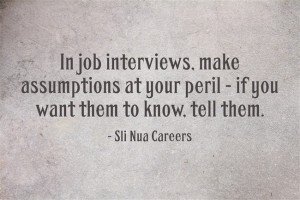By Liam Horan, Career Coach & Managing Director, Sli Nua Careers

Doing a good job interview is a balancing act.
Lean too far one way, and you under-sell yourself grievously. Lean too far the other way, and you create a promise your talents cannot fulfil.
In my experience, the first problem is the more common of the two: candidates who, in their efforts to avoid appearing arrogant, fail to communicate their suitability for the job at hand. An interview is not a time to hide your strengths – not alone will an interview panel tolerate you talking yourself up, they actually want you to do so.
Before an interview, get ready to be your own best advocate. Nobody else will argue for you. You should be in such a state of readiness that even if the interview panel were not to pose a single question, you would still give them information to help them appoint you to the position.
Make assumptions at your peril. Do not assume they have studied your CV – if there is good stuff there, you must be prepared to repeat it in the interview.
Do not assume they know your career trajectory inside out – they might not even know the name of the company where you currently work, or what you do there. They might not even know your name.
Do not assume that just because you are good at your job, they will sense it: relying on clairvoyance is a dangerous approach.
If you want them to know, tell them. In fact, if you want them to really know and remember, you may have to tell them a second time.
 Back to the balancing act: there is a line separating confidence from arrogance and you need to be (just) on the right side of it. I would wager that the vast majority of people who read this column are not arrogant – if they were, they would not see the need to read a column designed to help them.
Back to the balancing act: there is a line separating confidence from arrogance and you need to be (just) on the right side of it. I would wager that the vast majority of people who read this column are not arrogant – if they were, they would not see the need to read a column designed to help them.
An interview is an opportunity to promote your candidacy. You should see it is that – and only that. Approach every twist and turn of the interview with this in mind. No matter what happens, you are there to sell your wares, so to speak.
This does not mean you rabbit on incessantly – a good salesperson would not do that – but you are ever vigilant to spot the opportunities where you can meet their need.
The apparently nonsensical question the interview panel throws at you should be handled, defused and sent back to them as an answer that puts you in the frame. Do not take it personally. Interview panels come in all shapes and sizes and panellists have their own hobby horses. That bizarre question will almost certainly be thrown at the next person in the door, and the person after that too, and, in the eyes of the interviewer, it offers some value in terms of sussing out the candidates.
Many candidates I have worked with come to me fearing they talk too much. In most cases, the opposite turns out to be the truth. They need to talk more. An answer should give ample detail without dovetailing off into unnecessary culs- de-sac. When preparing for an interview, you should identify the key elements of any example – what project managers call the critical path – and include those in your answer. Don’t explain every nook and cranny of an example; rather, give just enough to illustrate the point you’re trying to make about your strength, experience our attitude.
If you would like to make a booking with any of our career coaches, see HERE for CV Preparation and Interview Training.
